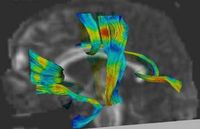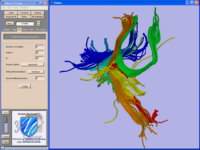Algorithm:MIT:New
Contents
- 1 Shape- and Atlas-Based Segmentation
- 2 DTI Analysis and Visualization
- 2.1 Tissue Classification
- 2.2 Boundary Localization
- 2.3 Registration Regularization
- 2.4 DTI Fiber Clustering/Atlas Creation/Analysis
- 2.5 Fiber Tract Modeling, Clustering and Quantitative Analysis
- 2.6 DTI-based Segmentation
- 2.7 Fiber-Tract-Bundle-based Non-Linear Registration
- 2.8 Stochastic Tractography
- 3 fMRI Detection and Analysis
- 4 Population Analysis of Anatomical Variability
- 5 Groupwise Registration
- 6 Collaborations with other groups in NAMIC
Shape- and Atlas-Based Segmentation
The goal of this project is to augment the segmentation process with prior information on the shape of the anatomical structures (shape atlas) learned from previously segmented scans (using, for example, Principal Component Analysis). We are working on methods that integrate the shape atlases with segmentation algorithms.
|
Tissue ClassificationThis type of algorithms assigns a tissue type to each voxel in the volume. Incorporating prior shape information biases the label assignment towards contiguous regions that are consistent with the shape model. More... New: K.M. Pohl, J. Fisher, S. Bouix, M. Shenton, R. W. McCarley, W.E.L. Grimson, R. Kikinis, and W.M. Wells. Using the Logarithm of Odds to Define a Vector Space on Probabilistic Atlases. Accapted to the Special Issue of Best Selected Papers from MICCAI 06 in Medical Image Analysis More... New: K.M. Pohl, R. Kikinis, and W.M. Wells. Active Mean Fields: Solving the Mean Field Approximation in the Level Set Framework. Accapted to IPMI 2007. More... Description - Publications - Software - AHM 2006 - AHM 2007 | |
Boundary LocalizationThis class of algorithms explicitly manipulates the representation of the object boundary to fit the strong gradients in the image, indicative of the object outline. Bias in the boundary evolution towards the likely shapes improves the robustness of the segmentation results when the intensity information alone is insufficient for boundary detection. More... | |
Registration RegularizationWe are interested in the effects of registration regularization on segmentation accuracy in joint registration-segmentation. More... New: Submission for MICCAI 2007 | |
DTI Analysis and VisualizationOur work in DTI analysis focuses on identifying new ways to provide an interpretation of the white matter connectivity and to utilize the information contained in the DTI images to create more comperehsive models of the brain architecture. atlases with segmentation algorithms. | |
|
Tissue ClassificationThis type of algorithms assigns a tissue type to each voxel in the volume. Incorporating prior shape information biases the label assignment towards contiguous regions that are consistent with the shape model. More... New: K.M. Pohl, J. Fisher, S. Bouix, M. Shenton, R. W. McCarley, W.E.L. Grimson, R. Kikinis, and W.M. Wells. Using the Logarithm of Odds to Define a Vector Space on Probabilistic Atlases. Accapted to the Special Issue of Best Selected Papers from MICCAI 06 in Medical Image Analysis More... New: K.M. Pohl, R. Kikinis, and W.M. Wells. Active Mean Fields: Solving the Mean Field Approximation in the Level Set Framework. Accapted to IPMI 2007. More... Description - Publications - Software - AHM 2006 - AHM 2007 | |
Boundary LocalizationThis class of algorithms explicitly manipulates the representation of the object boundary to fit the strong gradients in the image, indicative of the object outline. Bias in the boundary evolution towards the likely shapes improves the robustness of the segmentation results when the intensity information alone is insufficient for boundary detection. More... | |
Registration RegularizationWe are interested in the effects of registration regularization on segmentation accuracy in joint registration-segmentation. More... New: Submission for MICCAI 2007 | |
DTI Fiber Clustering/Atlas Creation/AnalysisThe goal of this project is to provide structural description of the white matter architecture as a partition into coherent fiber bundles and clusters, and to use these bundles for quantitative measurement. More... New: Monica E. Lemmond, Lauren J. O'Donnell, Stephen Whalen, Alexandra J. Golby. Characterizing Diffusion Along White Matter Tracts Affected by Primary Brain Tumors. Accepted to HBM 2007. More... Description - Publications - Software - AHM 2006 - PW 2006 Fiber Tract Modeling, Clustering and Quantitative AnalysisThe goal of this work is to model the shape of the fiber bundles and use this model discription in clustering and statistical analysis of fiber tracts. More... New: M. Maddah, W. M. Wells, S. K. Warfield, C.-F. Westin, and W. E. L. Grimson, Probabilistic Clustering and Quantitative Analysis of White Matter Fiber Tracts,IPMI 2007, Netherlands. New: M. Maddah, S. K. Warfield, W. E. L. Grimson, W. M. Wells, A Unified Framework for Clustering and Quantitative Analysis of White Matter Fiber Tracts, Accepted for publication in Medical Image Analysis. New: M. Maddah, W. M. Wells, S. K. Warfield, C-F. Westin, and W. E. L. Grimson, A Spatial Model of White Matter Fiber Tracts to be presented at ISMRM 2007, Berlin. Description - Publications - Software DTI-based SegmentationUnlike conventional MRI, DTI provides adequate contrast to segment the thalamic nuclei, which are gray matter structures. More... New: Ulas Ziyan, David Tuch, Carl-Fredrik Westin. Segmentation of Thalamic Nuclei from DTI using Spectral Clustering. Accepted to MICCAI 2006. More... Description - Publications - Software Fiber-Tract-Bundle-based Non-Linear RegistrationThe goal of this work is to utilize the anatomical information from segmented fiber bundles and use this information for registering fiber tracts and the underlying DTI images. More... Description - Publications - Software Stochastic TractographyThis work calculates posterior distributions of white matter fiber tract parameters given diffusion observations in a DWI volume. More... fMRI Detection and AnalysisWe are exploring algorithms for improved fMRI detection and interpretation by incorporting spatial priors and anatomical information to guide the detection. More... New: Wanmei Ou, Sandy Wells, Polina Golland. Bridging Spatial Regularization And Anatomical Priors in fMRI Detection. In preparation for submission to IEEE TMI. More... Description - Publications - Software - PW 2006 Population Analysis of Anatomical VariabilityOur goal is to develop mathematical approaches to modeling anatomical variability within and across populations using tools like local shape descriptors of specific regions of interest and global constellation descriptors of multiple ROI's. More... New: Mert R Sabuncu and Polina Golland. Structural Constellations for Population Analysis of Anatomical Variability. Description - Publications - Software - AHM 2006 Groupwise RegistrationWe are exploring algorithms for groupwise registration of medical data. More... New: Serdar K Balci, Polina Golland, Sandy Wells, Lilla Zollei, Mert R Sabuncu and Kinh Tieu. Groupwise registration of medical data. Collaborations with other groups in NAMIC
|




